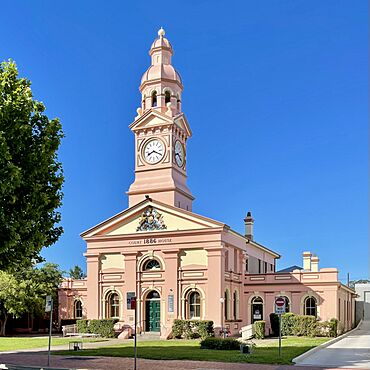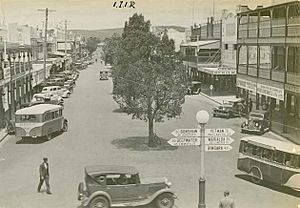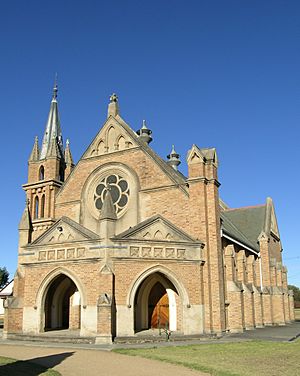Inverell facts for kids
Quick facts for kids InverellNew South Wales |
|||||||||
|---|---|---|---|---|---|---|---|---|---|

Inverell Court House, built in 1886
|
|||||||||
| Population | 12,057 (2021 census) | ||||||||
| Established | 1856 | ||||||||
| Postcode(s) | 2360 | ||||||||
| Elevation | 582 m (1,909 ft) | ||||||||
| Location |
|
||||||||
| LGA(s) | Inverell Shire | ||||||||
| County | Gough | ||||||||
| State electorate(s) | Northern Tablelands | ||||||||
| Federal Division(s) | New England | ||||||||
|
|||||||||
Inverell is a large town in northern New South Wales, Australia. It sits on the Macintyre River, close to the Queensland border. Inverell is the main town of Inverell Shire. It is located on the Gwydir Highway on the western slopes of the Northern Tablelands. The town has a mild climate. In 2021, about 12,057 people lived in Inverell. The whole Inverell Shire had 17,853 people.
Contents
History of Inverell
In 1848, a large farm called Inverell Station was set up by Alexander Campbell. It covered about 50,000 acres (20,000 ha) along the Macintyre River.
The name "Inverell" comes from a Scottish Gaelic phrase. It means "meeting place of the swans." This is because the MacIntyre River and Swanbrook Creek meet here. In the 1850s, the area was also known as "Green Swamp."
In 1853, Colin and Rosanna Ross, who grew wheat, opened a store. They asked for a town to be planned. This was done in 1858. The first land was sold soon after. The local post office changed its name to Inverell Post Office in 1859. Inverell officially became a town in March 1872.
A railway line reached Inverell in 1902. The last train ran in 1987, and the line closed later that year.
In 1871, Inverell had 509 people. By 1881, this grew to 1,212. After Australia became a federation, the population was 1,230 in 1911. It then grew to 6,530 by 1947 and 8,209 by 1961.
Mining Discoveries
Diamonds were found near Inverell in 1875. They were mined at a place called Copeton from 1883 to 1922. Sapphire mining started in 1919 near Inverell. At first, people dug for sapphires by hand in the streams. More serious mining began around 1960.
Heritage Places
Inverell has several places that are important for their history. These include:
- 56 Byron Street: The Inverell Shire Council Building
- 97 Otho Street: The Inverell Post Office
- Flepper Place
Population Details
| Historical population | ||
|---|---|---|
| Year | Pop. | ±% |
| 1921 | 4,369 | — |
| 1933 | 5,305 | +21.4% |
| 1947 | 6,530 | +23.1% |
| 1954 | 7,514 | +15.1% |
| 1961 | 8,209 | +9.2% |
| 1966 | 8,413 | +2.5% |
| 1971 | 9,712 | +15.4% |
| 1976 | 9,432 | −2.9% |
| 1981 | 9,734 | +3.2% |
| 1986 | 9,693 | −0.4% |
| 1991 | 9,736 | +0.4% |
| 1996 | 9,378 | −3.7% |
| 2001 | 9,525 | +1.6% |
| 2006 | 9,749 | +2.4% |
| 2011 | 9,347 | −4.1% |
| 2016 | 9,547 | +2.1% |
| 2021 | 9,654 | +1.1% |
| Source: Australian Bureau of Statistics data. | ||
The 2016 census showed that 11,660 people lived in Inverell.
- About 9.5% of the people were Aboriginal and Torres Strait Islander.
- Most people (86.0%) were born in Australia.
- The next most common birthplaces were the Philippines (1.4%) and England (1.2%).
- Nearly 90% of people spoke only English at home.
- The main religions were Anglican (28.8%), Catholic (22.9%), and No Religion (20.2%).
Local Industries
The area around Inverell has very good farmland. Farmers grow many different crops. These include wheat, barley, oats, sorghum, wine grapes, and maize.
Mining is also important. People find tin, sapphires, zircons, and diamonds (mostly for industrial use). Inverell is known as the "Sapphire City." This is because many sapphires were found here, especially in the 1970s.
Copeton Dam is the main water source for the region. It was finished in 1976. Even though it looks smaller than Sydney Harbour, it can hold almost twice as much water! An annual fishing festival is held there.
Culture and Fun Things to Do
The Grafton to Inverell Cycle Classic is a famous bike race. It starts in Grafton and goes through Glen Innes. The race finishes in Inverell. It is a tough 230 km ride over the Gibraltar Range. Riders climb from 23 metres above sea level to 1260 metres. The race usually takes six to seven hours.
Inverell is home to the Bruderhof. This is a Christian community where people share everything they own. They also run a publishing business.
The National Transport Museum is a great place to visit. It has over 120 old cars, trucks, and motorcycles.
Inverell is the last place in Australia to have a Coles New World supermarket. It has kept this name since the early 1990s.
Education
Inverell has two primary schools: Ross Hill School and Inverell Public School. The two high schools are Inverell High School and Macintyre High School. Holy Trinity School is a Catholic school. It teaches students from Kindergarten to Year Ten.
Getting Around
Inverell has its own airport, Inverell Airport.
The town is on the Gwydir Highway. This is a main road that goes east to west across New South Wales. Thunderbolts Way also ends near Inverell.
Local bus services are run by Inverell Bus Service. They have two routes around town. Longer bus trips to Glen Innes are also available.
NSW TrainLink runs coach (bus) services from Inverell. These go to places like Moree, Grafton, Tamworth, and Armidale.
Sports in Inverell
The most popular sport in Inverell is Rugby league. The local team is the Inverell RSM Hawks. They play in the Group 19 Rugby League. Their home ground is Varley Oval. The Hawks have won six titles in their league. Their last win was in 2016. Many players from the club have gone on to play in the National Rugby League. These include Owen Craigie and Phil and Chris Bailey.
Other sports teams include:
- Inverell Highlanders RUFC (rugby union)
- Inverell Saints AFC (Australian rules football)
- Inverell FC (soccer)
Climate and Weather
Inverell has a subtropical climate. This means it has warm summers and mild winters. It gets most of its rain in summer. The town is located where the cool, wet Northern Tablelands meet the hot, dry plains. So, it has weather from both areas.
The hottest temperature ever recorded in Inverell was 43.7°C (110.7°F) on January 4, 1903. The coldest high temperature was 3.0°C (37.4°F) on July 3, 1984. In September 1892, Inverell had a big snowfall, with 4 to 5 inches (10 to 13 cm) of snow. Snow also fell in parts of the area on August 5, 1923.
| Climate data for Inverell Research Centre (1949–2020); 664 m AMSL; 29.78° S, 151.08° E | |||||||||||||
|---|---|---|---|---|---|---|---|---|---|---|---|---|---|
| Month | Jan | Feb | Mar | Apr | May | Jun | Jul | Aug | Sep | Oct | Nov | Dec | Year |
| Record high °C (°F) | 41.1 (106.0) |
41.3 (106.3) |
35.7 (96.3) |
32.1 (89.8) |
27.4 (81.3) |
25.6 (78.1) |
23.0 (73.4) |
31.9 (89.4) |
32.1 (89.8) |
36.2 (97.2) |
39.2 (102.6) |
41.5 (106.7) |
41.5 (106.7) |
| Mean daily maximum °C (°F) | 29.7 (85.5) |
28.9 (84.0) |
27.1 (80.8) |
23.6 (74.5) |
19.3 (66.7) |
15.8 (60.4) |
15.2 (59.4) |
16.7 (62.1) |
20.0 (68.0) |
23.2 (73.8) |
26.0 (78.8) |
28.4 (83.1) |
22.8 (73.1) |
| Mean daily minimum °C (°F) | 16.4 (61.5) |
16.3 (61.3) |
14.5 (58.1) |
11.0 (51.8) |
7.5 (45.5) |
4.9 (40.8) |
3.6 (38.5) |
4.4 (39.9) |
7.0 (44.6) |
10.3 (50.5) |
12.8 (55.0) |
15.1 (59.2) |
10.3 (50.6) |
| Record low °C (°F) | 6.5 (43.7) |
6.2 (43.2) |
3.4 (38.1) |
−0.3 (31.5) |
−3.5 (25.7) |
−5.5 (22.1) |
−5.0 (23.0) |
−4.3 (24.3) |
−2.0 (28.4) |
−1.0 (30.2) |
2.7 (36.9) |
5.7 (42.3) |
−5.5 (22.1) |
| Average precipitation mm (inches) | 99.1 (3.90) |
93.9 (3.70) |
69.8 (2.75) |
40.2 (1.58) |
47.9 (1.89) |
45.5 (1.79) |
47.9 (1.89) |
44.4 (1.75) |
48.3 (1.90) |
75.8 (2.98) |
87.0 (3.43) |
98.9 (3.89) |
800.6 (31.52) |
| Average precipitation days (≥ 0.2mm) | 9.8 | 8.4 | 6.9 | 5.6 | 6.0 | 7.0 | 7.3 | 6.6 | 6.6 | 9.2 | 9.3 | 9.9 | 92.6 |
| Mean monthly sunshine hours | 279.0 | 245.8 | 260.4 | 237.0 | 201.5 | 180.0 | 195.3 | 248.0 | 258.0 | 279.0 | 267.0 | 279.0 | 2,930 |
| Climate data for Inverell Comparison (1874–1997); 584 m AMSL; 29.78° S, 151.11° E | |||||||||||||
|---|---|---|---|---|---|---|---|---|---|---|---|---|---|
| Month | Jan | Feb | Mar | Apr | May | Jun | Jul | Aug | Sep | Oct | Nov | Dec | Year |
| Record high °C (°F) | 43.7 (110.7) |
41.7 (107.1) |
41.1 (106.0) |
33.9 (93.0) |
29.4 (84.9) |
25.6 (78.1) |
24.2 (75.6) |
29.4 (84.9) |
32.8 (91.0) |
36.7 (98.1) |
39.4 (102.9) |
41.9 (107.4) |
43.7 (110.7) |
| Mean daily maximum °C (°F) | 30.6 (87.1) |
29.8 (85.6) |
27.8 (82.0) |
24.1 (75.4) |
19.7 (67.5) |
16.2 (61.2) |
15.3 (59.5) |
17.2 (63.0) |
20.5 (68.9) |
24.0 (75.2) |
27.4 (81.3) |
29.7 (85.5) |
23.5 (74.4) |
| Mean daily minimum °C (°F) | 15.3 (59.5) |
14.8 (58.6) |
12.4 (54.3) |
7.8 (46.0) |
3.7 (38.7) |
1.2 (34.2) |
−0.2 (31.6) |
0.5 (32.9) |
3.5 (38.3) |
7.6 (45.7) |
11.1 (52.0) |
13.8 (56.8) |
7.6 (45.7) |
| Record low °C (°F) | 2.8 (37.0) |
2.2 (36.0) |
1.5 (34.7) |
−4.3 (24.3) |
−7.5 (18.5) |
−10.0 (14.0) |
−10.6 (12.9) |
−9.4 (15.1) |
−7.2 (19.0) |
−6.7 (19.9) |
−1.7 (28.9) |
1.5 (34.7) |
−10.6 (12.9) |
| Average precipitation mm (inches) | 98.7 (3.89) |
83.4 (3.28) |
65.1 (2.56) |
43.3 (1.70) |
47.9 (1.89) |
49.7 (1.96) |
50.8 (2.00) |
44.4 (1.75) |
48.5 (1.91) |
67.7 (2.67) |
73.9 (2.91) |
90.6 (3.57) |
765.8 (30.15) |
| Average precipitation days (≥ 0.2mm) | 8.7 | 7.5 | 6.6 | 5.2 | 5.7 | 6.7 | 7.0 | 6.6 | 6.4 | 7.9 | 8.0 | 8.6 | 84.9 |
| Source: Australian Bureau of Meteorology; Inverell Comparison | |||||||||||||
Inverell has had three weather stations over the years. These stations collect information about the weather. They are:
- Inverell Comparison (from 1874 to 1997)
- Inverell Research Centre (started in 1949 and still running, now an automatic station)
- Inverell (Raglan Street) (started in 1995 and still running, with a human observer)
Famous People from Inverell
Many notable people have come from or lived in Inverell. Here are a few:
- Chris Bailey (born 1982), a rugby league player.
- Phil Bailey (born 1980), a former professional rugby league player.
- Owen Craigie (born 1978), a former rugby league player.
- Lucien Lawrence Cunningham (1889–1948), a farmer and politician.
- Steve Elkington (born 1962), a golfer who won the 1995 US PGA Championship.
- Susan Hampton (born 1949), a poet who won the Judith Wright Award.
- Heinrich Haussler (born 1984), a cyclist.
- Peter Hewat, a former rugby union player.
- George Kneipp (1922–1993), a judge in Queensland.
- Colin Madigan (1921–2011), an architect.
- Rick McCosker (born 1946), a cricketer.
- Leon Punch (1928–1991), a former Deputy Premier of New South Wales.
- Ivan Sen (born 1971), a filmmaker.
- Leo Senior (1887–1975), a former rugby league player.
- Scott Sunderland (born 1966), a former cyclist.
- John Williams (born 1955), a Senator for New South Wales.
- Bronwyn Oliver, née Gooda (1958–2006), a sculptor. She is considered one of Australia's most important artists. Her works are in major galleries.
See also
 In Spanish: Inverell para niños
In Spanish: Inverell para niños




